 Objectives
Objectives
Educational Empowerment
Provide ESG educational opportunities to a variety of audiences to ensure comprehensive consideration of Environmental, Social, and Governance factors, facilitating the region's just transition to a regenerative economy.
Research and Engagement
Foster collaborative ESG research with industry stakeholders to effectively mobilize businesses to participate in the just transition.
Convening Corporate Partnership Options
For corporate partners interested in guiding and early collaboration opportunities with specific Workstreams. Contact us at CSB@Katz.Pitt.Edu to explore further.
Resources
- Internal Resources
-
- Playlist: ESG Rosetta Stone-related Podcast Episodes
- Find ESG-centered insights from our Sustaining Sustainability Podcast which draws on experts around the world to identify and contextualize actionable sustainable business insights.
- Katz Sustainable Business Micro-Credential
- The Katz Micro-Credential in Sustainable Business provides guidance on how companies navigate social, environmental, and financial aspects to positively influence stakeholders and financial well-being. It is eligible for those with a bachelor’s degree and current Pitt graduate students.
- Pitt-wide Sustainability-Related Courses
- The University of Pittsburgh is committed to the integration of sustainability across disciplines. Find a comprehensive list of courses with sustainability as a learning outcome.
- YouTube Playlist
- Please check out this playlist of past ESG-oriented events at the CSB.
- Playlist: ESG Rosetta Stone-related Podcast Episodes
- External Resources
-
Sustainability Training Resources
With research support from Nishant Saun, a Katz MBA student, Trish Kenlon, the founder of Sustainable Career Pathways, has curated a list of educational resources for sustainability across various budgets and subject matter needs. Here are some of those lists:
Faculty Highlight
- The Economics of Humanity: Dr. Carey Treado
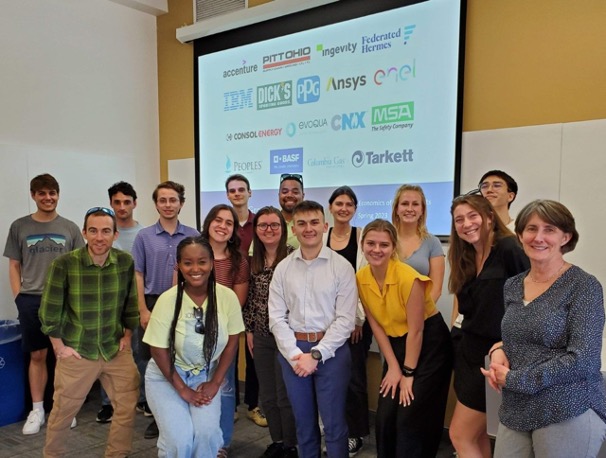
Dr. Carey Treado's Economics of Humanity course centers on equipping students with practical skills to assess corporate responsibility. Throughout the fall semester, Economics students analyze a company's ESG reports, evaluate human rights policies across its value chain, and employ a double materiality matrix. Culminating in presentations to the University of Pittsburgh Chief Investment Officer, students also evaluate another university's socially responsible investment fund, offering recommendations for enhancing the University of Pittsburgh's own ESG performance. The second semester delves deeper into company analysis, considering factors like investment and trade policies, as well as internet freedom. This comprehensive approach empowers students to navigate the intersection of economics and human rights, fostering a hands-on understanding of responsible business practices.
- ESG Disclosure: Lessons from Around the World: Dr. Elise A. Boyas
-
Dr. Elise A. Boyas plays a crucial role in preparing her students to navigate the escalating demands and responsibilities associated with ESG considerations. With a focus on accounting responsibility, she emphasizes ESG reporting, its regulation, and assurance. Through hands-on projects, students engage in in-depth analyses of company financials and ESG performance. Dr. Boyas guides them in understanding the evolving landscape of ESG disclosures globally. Her innovative approach extends to a global research practicum, where students travel to regions at the forefront of ESG disclosure and integration. By learning directly from companies and academics in these locations, students gain valuable insights into best practices, contributing to their comprehensive understanding of the dynamic and evolving ESG landscape.
- Researching the Economic Value of Sustainable Business: Dr. Mark Ma
-
Dr. Mark Ma's research collectively revolves around investigating the intersection of ESG considerations with corporate decision-making and outcomes. His work explores how various aspects of ESG, including product safety, CSR reporting, environmental regulations, and diversity and inclusion, influence corporate behavior and financial performance. Through these diverse topics, Dr. Ma consistently emphasizes the value that ESG considerations add to a company, shedding light on the multifaceted ways in which responsible and sustainable practices contribute to both ethical corporate behavior and positive financial outcomes.
ESG RS Events
- Sustainability Camp
-
The annual Sustainability Camp commenced its inaugural event on August 10th, 2023, at Mervis Hall, University of Pittsburgh. This ongoing series features compelling presentations and discussions, spotlighting the intersection of sustainable business research and real-world applications. The camp continues to unveil the intricate dimensions of sustainability in business, emphasizing effective collaboration between academia and industry. By aligning research with practical business needs, the event bridges the gap between theory and application. Notably, it underscores actionable opportunities for corporations to address sustainability challenges. Moving forward, the Sustainability Camp remains committed to providing an annual platform for knowledge exchange and fostering impactful collaborations between researchers and industry professionals. If you possess data ready for research, we invite you to connect with us for potential collaborations.
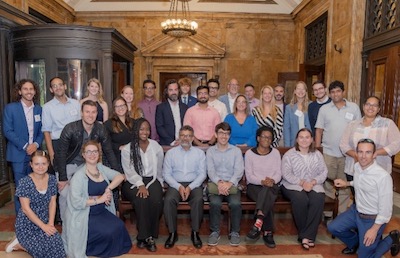

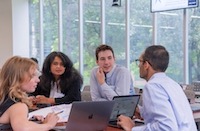
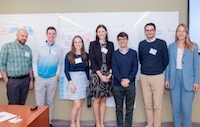
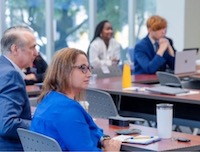

- ESG Literacy Program
-
Leadership for Long-Term Value Creation and Resilience: Pillars of ESG Workshop – Spring 2024
This one-day workshop will provide senior leader attendees with a comprehensive overview of ESG, including its definition, link to corporate purpose, and value creation potential with specific considerations of the regional context. Participants will learn how to integrate ESG into their business strategy, measure and monitor ESG performance, and communicate ESG goals effectively.
Bridging the Gap: Advancing Sustainable Business Practices through Knowledge Creation
- CSB-Facilitated Research Opportunities
-
We aspire to make the Center for Sustainable Business a world-renowned hub for applied research in the field of sustainable business models. Find out how.
- Support through the University-level Sustainability Institute
-
Annually, the Mascaro Center for Sustainable Innovation (MCSI) at the University of Pittsburgh requests faculty grant proposals for interdisciplinary sustainability education and research initiatives. Find out more information and apply.
